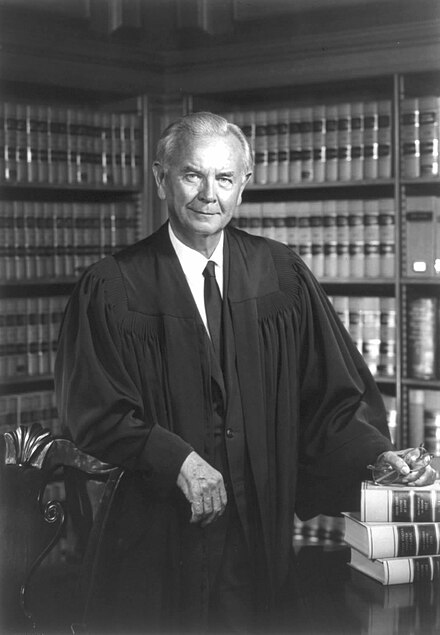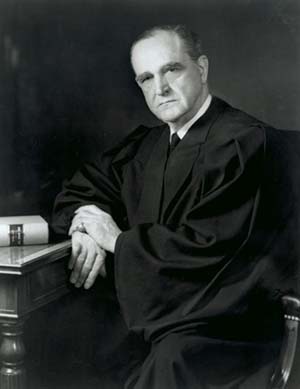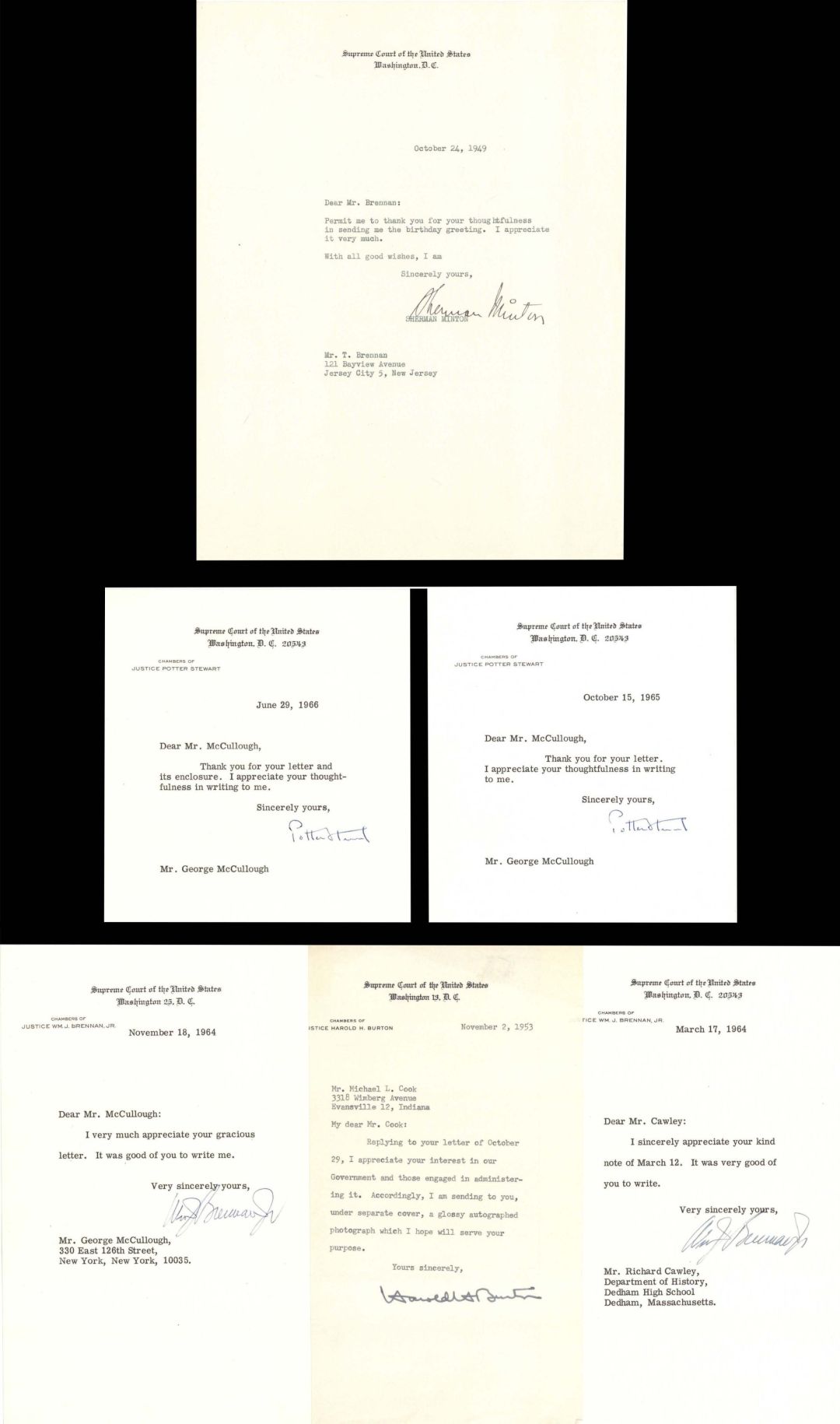6 Letters signed by Supreme Court Justices - 1940's-1960's dated Autograph
Inv# AU1819 Autograph6 typed letters signed by Supreme Court Justices; William J. Brennan, Jr.(2), Harold Burton, Potter Stewart(2) and Sherman Minton.

William Joseph Brennan Jr. (April 25, 1906 – July 24, 1997) was an American lawyer and jurist who served as an Associate Justice of the Supreme Court of the United States from 1956 to 1990. He was the seventh-longest serving justice in Supreme Court history, and was known for being a leader of the Court's liberal wing. Born in Newark to Irish immigrant parents, Brennan studied economics at the University of Pennsylvania and then attended Harvard Law School. He entered private legal practice in New Jersey and served in the U.S. Army during World War II. He was appointed in 1951 to the Supreme Court of New Jersey. Shortly before the 1956 presidential election, President Dwight D. Eisenhower used a recess appointment to place Brennan on the Supreme Court. Brennan won Senate confirmation the following year. He remained on the Court until his retirement in 1990, and was succeeded by David Souter. On the Supreme Court, Brennan was known for his outspoken progressive views, including opposition to the death penalty as he dissented in more than 1,400 cases in which the Supreme Court refused to review a death sentence, and support for abortion rights and gay rights. He authored numerous landmark case opinions, including: Baker v. Carr (1962), establishing that the apportionment of legislative districts is a justiciable issue; New York Times Co. v. Sullivan (1964), which required "actual malice" in libel suits brought by public officials; Eisenstadt v. Baird (1972), which established a legal right to contraception for unmarried people and helped solidify the sexual revolution; and Craig v. Boren (1976) which established that laws which discriminate on the basis of sex are subject to heightened scrutiny under the Equal Protection Clause. Due to his ability to shape a wide variety of opinions and bargain for votes in many cases, he was considered to be among the Court's most influential members. Justice Antonin Scalia called Brennan "probably the most influential Justice of the [20th] century." Read more at https://en.wikipedia.org/wiki/William_J._Brennan_Jr.

Harold Hitz Burton (June 22, 1888 – October 28, 1964) was an American politician and lawyer. He served as the 45th mayor of Cleveland, Ohio, as a U.S. Senator from Ohio, and as an associate justice of the Supreme Court of the United States.
Born in Boston, Burton practiced law in Cleveland after graduating from Harvard Law School. After serving in the United States Army during World War I, Burton became active in Republican Party politics and won election to the Ohio House of Representatives. After serving as the mayor of Cleveland, Burton won election to the United States Senate in 1940. After the retirement of Associate Justice Owen J. Roberts, President Harry S. Truman successfully nominated Burton to the Supreme Court. Burton served on the Court until 1958, when he was succeeded by Potter Stewart.
Burton was known as a dispassionate, pragmatic, somewhat plodding jurist who preferred to rule on technical and procedural rather than constitutional grounds. He was also seen as an affable justice who helped ease tension on the court during an extremely acrimonious time. He wrote the majority opinion in Joint Anti-Fascist Refugee Committee v. McGrath (1951) and Lorain Journal Co. v. United States (1951). He also helped shape the Court's unanimous decision in Brown v. Board of Education (1954).

Potter Stewart (January 23, 1915 – December 7, 1985) was an American lawyer and judge who served as an associate justice of the United States Supreme Court from 1958 to 1981. During his tenure, he made major contributions to criminal justice reform, civil rights, access to the courts, and Fourth Amendment jurisprudence.
After graduating from Yale Law School in 1941, Stewart served in World War II as a member of the United States Navy Reserve. After the war, he practiced law and served on the Cincinnati city council. In 1954, President Dwight D. Eisenhower appointed Stewart to a judgeship on the U.S. Court of Appeals for the Sixth Circuit. In 1958, Eisenhower nominated Stewart to succeed retiring Associate Justice Harold Hitz Burton, and Stewart won Senate confirmation afterwards. He was frequently in the minority during the Warren Court but emerged as a centrist swing vote on the Burger Court. Stewart retired in 1981 and was succeeded by the first female United States Supreme Court justice, Sandra Day O'Connor.
Stewart wrote the majority opinion in cases such as Jones v. Alfred H. Mayer Co., Katz v. United States, Chimel v. California, and Sierra Club v. Morton. He wrote dissenting opinions in cases such as Engel v. Vitale, In re Gault and Griswold v. Connecticut. He popularized the phrase "I know it when I see it" with a concurring opinion in Jacobellis v. Ohio, in which a theater owner had been fined for showing a supposedly obscene film.

Sherman "Shay" Minton (October 20, 1890 – April 9, 1965) was an American politician and jurist who served as a U.S. senator from Indiana and later became an associate justice of the Supreme Court of the United States; he was a member of the Democratic Party.











Ebay ID: labarre_galleries